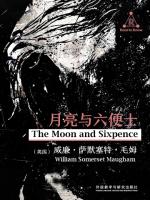Book Review
小咩咩咩咩
Even if you had never seen the Moon and Sixpence, you have a very strong
possibility of hearing a sentence written by Maugham in his letter,
"if you look on the ground in search of a sixpence, you don't look
up, and so miss the moon." Although the title contains two
meaningful symbols, the moon and sixpence, Maugham didn’t explain them
clearly in the text. Before we pursue the deep understanding of this
literature, the first thing to be sure of is what the moon and sixpence
refer to. A big amount of people insist that the book is about the
choose between dreams and material demand. Of course, a thousand
readers, have a thousand Hamlet, but Maugham gave the only answer. In
the text, Twopence is reminded for three times. Initially, Charles
Strickland, the hero of the novel, said, “my dear fellow, I don’t care.
It doesn’t matter a twopenny damn to me one way or other”. Later, he
said, “Children. How can you care for the opinion of the crowd, when you
don’t care twopence for the opinion of the individual?” After Blanche
Stroeve’s suicide, he said indifferently, “Do you really care a twopenny
damn of Blanche Stroeve is alive or dead?” The word twopence appears
three times, and has three different meanings: family, society and
ethics. Therefore, sixpence refers to the reality including family,
society and ethics. In this respect, the Moon and Sixpence refer to
dreams and reality. In the past, we regarded material demand as the
biggest barrier to chasing our dreams. The Moon and Sixpence offers a
fresh look at the problem. In order to chase his dream well ahead of his
time, Strickland breaks the limit of family, society and ethics one by
one. By the end of the story, he lives in a utopia and marries a native
wife who doesn’t disturb him. It’s family, society and ethics that place
restrictions on geniuses’ ambitions, and Strickland is just a character
who breaks through regular rules of reality. By creating such an image,
the author informs us that the reality composed of family, societyand
ethics is the biggest barrier to chasing our dreams. Shaping such an
unusual image of dream chaser, is persuading readers to follow suit
Maugham’s final purpose? No matter what Maugham’s motivation is, it’s
obviously that we aren’t supposed to abandon family, society and ethics
like Strickland. To tell you the truth, I hate Charles Strickland due to
his extreme selfishness. It’s the selfish desire and vickedness that
drove him to harm to others. However, in some respects, his deeds are
admirable because of his amazing power on implementation. What’s more,
he never regrets the choice he has made, for this reason alone, most of
people can’t compare with him. Actually, it’s unrealistic for us
ordinary people to abandon family, society and ethics. Finding a balance
between dreams and reality should normally be enough. Yang Liping, the
well-known dancer, decides not to have children owing to her dance
career. Van Gogh persisted drawing although he suffered a lifetime of
poverty. The artists above are household as dream chasers, even so, what
they abandon is not their kindness or even the whole reality. Generally
speaking, everybody has his or her own decisions when they are faced
with a choice between dreams and reality. Based on ethical principles,
decisions can be different, but no decision is superior to others. More
than anything, if you desire to achieve something meaningful, just do
it. The one thing to remember is that you should never regret for your past.



 京公网安备 11010802032529号
京公网安备 11010802032529号